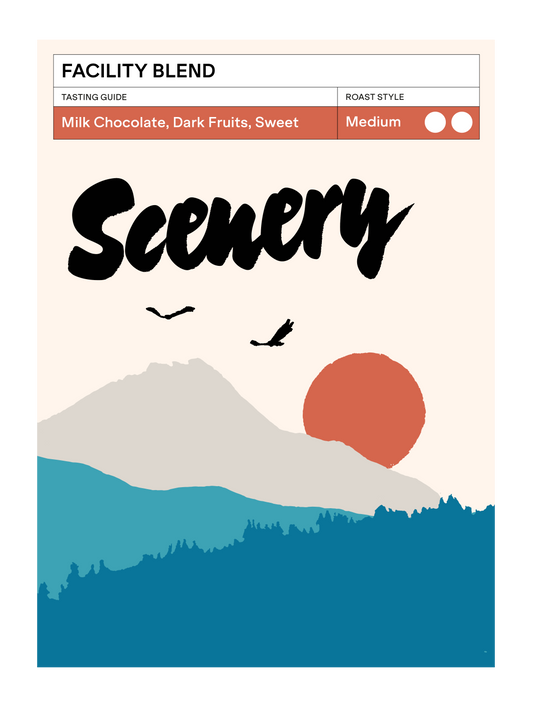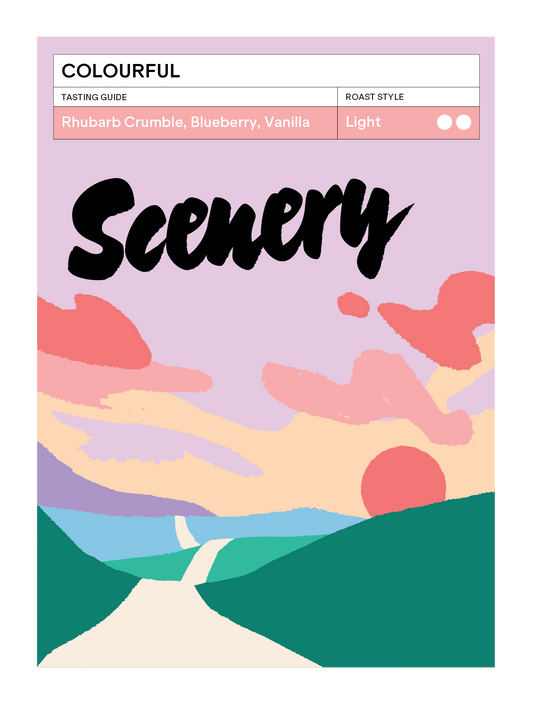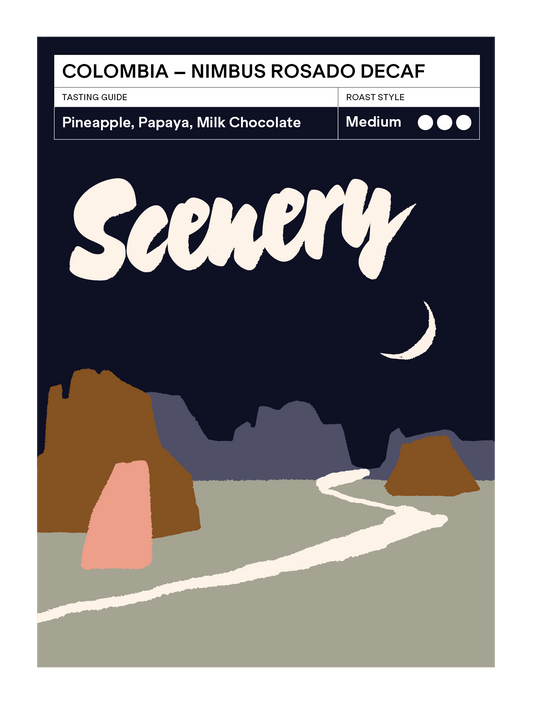Collaboratively sourced with our great friends - Paradox Coffee and Batch Baby, for their pop-up collab space in the NTS Loft: Daze.
This fresh crop Ethiopian “static cherry” anaerobic natural lot from the team at Bette Buna Megadu is a bright and elevated take on the classic Guji profile, with high impact at origin.
Brew Guide:
Best Brewed with: Filter
A fantastic example of the classic Guji profile - juicy ripe berries and intense florals that’s lifted by the additional anoxic fermentation. Incredibly dense and concentrated, this is one of our fastest roasts yet as the small screen-size dense beans can take the heat, preserving acidity and the lightest florals.
Best rested for: 3-4 weeks
For Filter: We recommend a ratio of 65g/L and 98°C water, with a finer grind as contrary to the classic Ethiopian experience, this coffee drains faster.
For Espresso: 18g in, 50g out, 20-25s turbo-style shots are our preference for peak floral blueberry..
We’re tasting:
Mango, lavender and blood orange aromatics. We’re tasting a strong note of lavender, floral honey and ripe blueberry. As it cools, the acidity shifts to be more like the European blueberry (bilberry) - slightly brighter, tarter and more complex than its Canadian cousin, and a lilac florality joins the lavender. White chocolate and blood orange notes lend a depth of complexity to a deeply complex and clean cup
Traceability:
Country of Origin: |
Ethiopia |
Region: |
Megadu, Guji |
Farm: |
Bette Buna Megadu |
Producer: |
Dawit & Hester Syoum, Alongside Demelash Hailu, ato Sentayehu, ato Saffay, gash Duba, Kemer Saffai, Abiti |
Variety: |
74112, 74110 & Enat Buna Megadu [Local landrace] |
Elevation: |
1900-2200 MASL |
Process: |
Static Cherry Anaerobic: Ripe cherries picked and floated. Briefly dried on raised beds, before being added to hermetically sealed barrels alongside water and anaerobically fermented for 72 hrs, tipping the fermentation environment towards anoxic conditions (changing the microbial pathway for creation of flavour precursors). Post ferment, cherries drained and dried on raised beds with shade control. Coffees milled prior to export in the Guji highlands, with sorting for screen size, density alongside full optical sorting, with a final hand-sort check prior to bagging. |
Import Partner: |
Direct purchase from Bette Buna. |
Harvest |
Crop 23/24, Arrived UK: 26th June 24 |
The Story
SCENERY x DAZE x BETTE BUNA:
We’ve always been massive fans of Paradox and Batch Baby - owner-operators daring to do things differently, push London coffee forward, and just all round excellent & lovely people.
They both took the leap very early on to stock some of our coffee, an endorsement that helped springboard us forward and continue to share the coffees we love; and their advice and feedback as experienced multi-roaster purchasers has been invaluable. We were hyped to see their collab space open up - Daze - in the NTS Loft in Netil house, with some of the most exciting roasted coffee sourcing we’ve seen in a long while in London, and an incredible vibe.
We’re strong believers that the real power of the speciality industry is in our collaborative and open nature - that we can act to better the experience for coffee lovers and coffee producers alike through co-opetition and the sharing of knowledge.
When Tom, Saskia, Zain and Kat approached us to talk about a collab coffee release, we didn’t have to think twice. A round of gathering samples at the most perfect time of the year - the arrival of the first fresh crop Ethiopian coffees - saw a chance for a further connection.
We’ve been tasting excellent renditions of the coffees from Hester and Dawit Syoum’s two farms for a few years now, including a range of special prep, higher intervention coffees that took the classic Ethiopian regional cup profile to the next level.
A recent change to Ethiopian coffee export laws set a minimum price floor for the export anaerobic/experimental coffees, this increase significantly upped the green cost for most importers - causing many of our contacts to abandon these lots for this season, shying away from the risk. We knew these lots, from a fully producer owned value chain and representing higher-value addition and landing in the Netherlands were the perfect fit in both taste profile and story for the collab release.
On a table filled with high technical intervention Colombian lots, these coffees stood out. A last minute thought: “Could we showcase this at World of Coffee Copenhagen?” - nary two weeks away from the moment we cupped - saw Hester and us move heaven and earth to get the coffees across the channel & in the roastery, arriving in the nick of time to get profiled and packed.
To adapt a Mark Twain quote - Green buying is oft just luck, damned luck, and logistics.
Bette Buna:
The first Bette Buna (“House of Coffee”) farm was founded in 2019, after Dawit inherited his grandfather’s coffee farm in Sidama. Dawit’s grandfather was a respected community leader, and with that in mind Hester and Dawit set out to create a sustainable, community led future for coffee farming in Ethiopia. They intend to achieve this by producing higher quality coffees, with collaboration and community development intimately linked to this. The funds from fair pricing and export help pay for community education and increased living standards, with living incomes a pillar of the Bette Buna mission.
Dawit and Hester have been purchasing the farms immediately abutting the Taferi Kela farm, adopting a high standard for purchasing (a minimum price for the land, alongside paying out 2 years of future production profits for the land at the point of sale), alongside offering the farmers employment at Taferi Kela.
By acting as a vertically integrated supply chain and increasing the export value of the centrally processed coffees, this both increases the income of the farmers turned employees beyond what selling their cherry to a station might have done, and socialises the profits whilst removing personal risk. Bette Buna have also established a nursery at Taferi Kela, distributing both improved JARC cultivars (higher yielding and more disease resistant) as well as shade trees and staple food crops. The impact of this nursery in terms of livelihood for subsistence farming cannot be understated, and the return to agro-forestry by increased shade tree planting is a positive move on a warming planet. The work to establish more shade trees is hand-in-hand with a rewilding project to increase the native forest cover in the immediate area around Taferi Kela.
Dawit and Hester’s second farm (the farm this lot hails from) is located in Guji, a region that has become famed for the particular quality of the natural process coffees produced here. Coffees from Guji are deeply fruity and berrylike, something we particularly enjoyed as a contrast when compared to the tarter citrus and white flower cups that you might find in Yirgacheffe or Sidama coffees. The provenance of Ethiopian coffee regions is really not unlike that of the different wine regions in France - particular combinations of altitude, microclimate and the local predominance of local landraces vs locally improved cultivar plantings (akin in effect to the different varieties of grapes you might find in the wine regions) shift the cup profile. Fruit flavours are a real highlight of Ethiopian coffee - from the lower grade lots that intermingle with chocolate and spice notes, to the highest grades that are so outrageously sweet, bright and floral that prior to high technical intervention coffee used to be the main gateway into discovering speciality coffee. We think that Ethiopia is such an under-valued origin - the same cup profile from a high altitude farm in Central or South America would command a hefty premium.
The Megadu farm in Guji is over 220 HA, lead by 3 community leaders (Abbaa Gadaa). Of this 220 HA, Bette Buna manages a quarter, acting as a pilot project for many of the community lead initiatives Hester and Dawit run. The processing station, located centrally in the farm, allows high value return processing (such as anoxic fermentation and extended ferments) alongside well executed classic processing, and crucially drying. Both farms produce their own coffee for production, but also purchase cherry from local smallholders for onwards processing. We’re stoked to be purchasing this coffee for Daze - it truly has collaboration built into its very core from producer to consumer - and to start a purchasing relationship with Dawit and Hester, one to which we’re already looking ahead with future seasons to come.

![[24] Scene Better Daze: Ethiopia - Bette Buna Megadu [CROP 23/24 ARCHIVE]](http://scenery.coffee/cdn/shop/articles/daze_collab_shopify_1.png?v=1726131100&width=1100)




![Mexico - Electrónicas Mazateca [25/26]](http://scenery.coffee/cdn/shop/files/mexico_electronicas_2526_shopify.png?v=1767970714&width=533)



![Colombia - Quebraditas Sidra Thermal Shock Washed [25/26]](http://scenery.coffee/cdn/shop/files/colombia_quebraditas_sidra_2526_shopify.png?v=1765544630&width=533)


![Colombia - Luz Ángela's Chiroso [25/26]](http://scenery.coffee/cdn/shop/files/colombia_luz_angela_chiroso_2526_shopify.png?v=1764359755&width=533)
